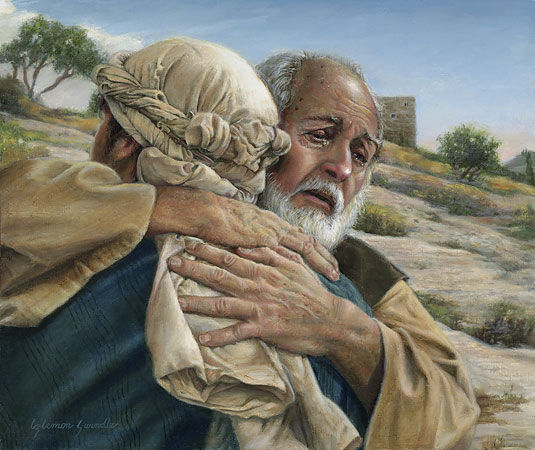The Pharisees said, “Teacher, rebuke your
disciples.” Jesus responded, “I tell you, if they keep silent, the stones will
cry out!” Jesus usually takes the humble
approach, but in this instance he allows the people to praise Him. The Pharisees do not like this, for the
people are praising Him like they did King David, and praising Him more so
actually, praising Him as the Messiah. And yet, this praise, of waving our palms and
singing, “Hosanna to the Lord. Praise be
to the one who comes in the name of the Lord” must not just be an empty
shouting, but must come from the depths of our hearts. Jesus enters through the gates of the city,
but more so does He wish to enter through the gates of our hearts; during Lent
and especially now as we enter Holy week Jesus desires to fill our hearts, but
we must first open them wide to receive Him.
As I reflected and prayed throughout Lent I felt
that the Lord wants many things for us but three kept coming back to me and
that was freedom, happiness, and friendship.
A good and loving King wishes his people to have
freedom, that they will have the freedom to move about, the freedom to have a
sense of ownership within the kingdom, the ability to express themselves and
even offer fraternal correction to the king, and that they are never
oppressed. The Israelites were shouting
and signing that day because they saw Jesus as a new King David, but He was
more than that, yes He wants us to be free in the political sense of the term,
but more importantly He wants us to be free from sin and evil. St. Paul tells us we are either slaves to sin
or slaves to righteousness, but that freedom is complete, real, and holy only
when we are slaves to Jesus, because in the surrendering to the Truth, to the
Good, to our Lord is when we experience true freedom.
All of us wish to be happy and we wish it all the
time, happiness not in the sense that I am always smiling, that would be forced
and not real, but that our overall disposition is one of happiness. When people describe us we desire that they
would call us a “happy person.”
Happiness comes from inside, a feel of contentment. What takes happiness away or diminishes it is
sin. Ironic how sin looks like happiness,
disguises itself as such, but then comes the emptiness, the guilt, that “something
is missing feeling.” When we live
virtuously instead of the guilty or empty feelings I just described, they are
replaced with joy, sense of accomplishment, sense of belonging and purpose, a
sense of relationship, all of which makes one happy.
And finally, friendship. In the Gospel of John chapter 15 Jesus calls
his Apostles his friends, they are no longer just simply his servants. Friendship is based on trust, faith, and
truly knowing the other. If you are
married obviously (and hopefully) your spouse is your greatest friend, but all
of us need that friend outside of our immediate circle of family. A person that knows us like the back of their
hand who anticipates our feelings, someone who will listen, someone who will be
there in dark hours but also in bright ones.
King David had Jonathan, Abraham had his nephew Lot, Moses had Aaron,
Paul had Barnabas, and we have Jesus, who today wishes to enter into the city
of hearts, into the very depths of our souls.
Why are we holding out our palm branches, why are we
signing, and carrying on like the Israelites of old? Because Jesus is coming, our King and our
God, pray that we all receive Him, Amen.
FJ




